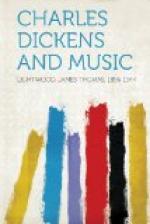When he grew up he retained his love of vocal music, and showed a strong predilection for national airs and old songs. Moore’s Irish Melodies had also a special attraction for him. In the early days of his readings his voice frequently used to fail him, and Mr. Kitton tells us that in trying to recover the lost power he would test it by singing these melodies to himself as he walked about. It is not surprising, therefore, to find numerous references to these songs, as well as to other works by Moore, in his writings.
From a humorous account of a concert on board ship we gather that Dickens possessed a tenor voice. Writing to his daughter from Boston in 1867, he says:
We had speech-making and singing in the saloon of the Cuba after the last dinner of the voyage. I think I have acquired a higher reputation from drawing out the captain, and getting him to take the second in ’All’s Well’ and likewise in ’There’s not in the wide world’[2] (your parent taking the first), than from anything previously known of me on these shores.... We also sang (with a Chicago lady, and a strong-minded woman from I don’t know where) ‘Auld Lang Syne,’ with a tender melancholy expressive of having all four been united from our cradles. The more dismal we were, the more delighted the company were. Once (when we paddled i’ the burn) the captain took a little cruise round the compass on his own account, touching at the Canadian Boat Song,[3] and taking in supplies at Jubilate, ’Seas between us braid ha’ roared,’ and roared like ourselves.
J.T. Field, in his Yesterdays with Authors, says: ’To hear him sing an old-time stage song, such as he used to enjoy in his youth at a cheap London theatre ... was to become acquainted with one of the most delightful and original companions in the world.’
When at home he was fond of having music in the evening. His daughter tells us that on one occasion a member of his family was singing a song while he was apparently deep in his book, when he suddenly got up and saying ’You don’t make enough of that word,’ he sat down by the piano and showed how it should be sung.
On another occasion his criticism was more pointed.
One night a gentleman visitor insisted on singing ‘By the sad sea waves,’ which he did vilely, and he wound up his performance by a most unexpected and misplaced embellishment, or ‘turn.’ Dickens found the whole ordeal very trying, but managed to preserve a decorous silence till this sound fell on his ear, when his neighbour said to him, ’Whatever did he mean by that extraneous effort of melody?’ ‘Oh,’ said Dickens, ’that’s quite in accordance with rule. When things are at their worst they always take a turn.’
Forster relates that while he was at work on the Old Curiosity Shop he used to discover specimens of old ballads in his country walks between Broadstairs and Ramsgate, which so aroused his interest that when




